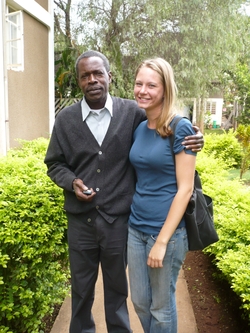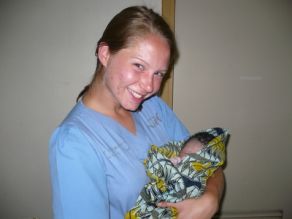Lisa King - Kilimanjaro Christian Medical Centre
by Lisa King
I met my first pediatric AIDS patient today. She’s in the bed by the window wearing a red jacket, and that’s not her mother sitting on the foot of her bed, that’s a woman from the orphanage where she lives. Her smile charms me instantly- melts me to the core really. I flip through her chart- only 8 years old, but she’s already battled HIV and tuberculosis. Now she’s back in the hospital with a probable case of pneumocystis pneumonia, too much for her weak immune system to handle. I’m listening to the resident, learning about how her pneumonia will be treated and which antiretroviral drugs she is taking. I can’t take my eyes off of her smile- she’s a beautiful little girl, and I know I’ll never forget her face.
This is the pediatrics ward of Kilimanjaro Christian Medical Centre (KCMC) in Moshi, Tanzania. I came to Tanzania for nine weeks to learn about the Prevention of Mother to Child Transmission (PMTCT) of HIV Programs here. I am interested in global health, particularly maternal and young child health, and I came to Tanzania because I wanted practical experience working in international health. I wanted to observe and learn how medicine can be practiced effectively in a resource-limited setting, to understand the unique daily challenges, and learn to think in an innovative way about improving health in third-world settings.

Lisa King and Dr. Oneko, chair of the Obstetrics and Gynecology Department at KCMC in Moshi, Tanzania.
I worked under the supervision of Dr. Oneko, the Chair of the Obstetrics Department at KCMC. A warm, kind man, and an excellent clinician, his charge to me was to “learn something!” during my time in Tanzania. The prevalence of HIV infection in Tanzania is 7%, so HIV in pregnancy is something that every obstetrician has to learn to manage clinically. The PMTCT program at KCMC involves a great degree of collaboration between obstetrics, pediatrics, and infectious disease departments, and offers quality care to HIV positive mothers through its prenatal clinics as well as in obstetrics and labor wards, and through follow up care at the Child Centered Family Care Clinic. The prenatal clinic, always full to overflowing, offers voluntary counseling and testing to pregnant mothers, along with presumptive treatment for malaria as well as iron and folic acid supplements. On the obstetrics ward upstairs, HIV positive pregnant women are counseled, their CD4 counts are measured, and antiretroviral medications are initiated if indicated. In accordance with Tanzanian national guidelines, HIV positive pregnant women receive a single-dose nevirapine tablet to take when labor starts. On the labor ward, obstetric practices are modified (ie. no episiotomies unless absolutely necessary) to reduce the risk of transmission to the infant, and a single oral dose of nevirapine is given to HIV-exposed infants.
In clinic and in the hospital, HIV positive women receive counseling regarding infant feeding options. The issue of breastfeeding with HIV is complicated because while choosing to breastfeed carries the risk of transmitting HIV, infant mortality rates are often higher with formula feeding due to increased risk of gastrointestinal illnesses (especially if clean water is not available), more frequent respiratory infections, and a higher risk of malnutrition. Infant feeding decisions are complicated by economic and social factors, as the cost of formula is often prohibitively expensive and cultural expectations to breastfeed may place significant pressure on the mother. Ideally, challenges and concerns regarding feeding decisions are addressed during follow up visits, but as an intern expressed to me, many HIV positive women “disappear” after they leave the hospital. This can happen if a woman lives a great distance from the hospital and is unable to afford transportation to follow up visits, or it could be difficult for her to be away from her family if she has many children, or her partner may not know her HIV status, making it difficult to explain the need for special visits.
Following exposed babies presents a significant challenge to PMTCT programs at KCMC. To address some of these issues in follow up care and management, another aspect of the PMTCT program operates in the Child Centered Family Care Clinic (CCFCC), which is funded through the Gates Foundation and opened in May of 2008. The CCFCC seeks to provide follow up care for HIV positive mothers, who are encouraged to bring their children and partners for testing. The aim of the CCFCC is to treat all family members in one central facility, under one umbrella of care, and thus to improve the health of the whole family. It’s an innovative model of care, and one that gives me hope.

Lisa King in the labor ward at KCMC.
During my time at KCMC, I wanted to spend time in the pediatrics department learning about HIV/AIDS in children. Pediatricians’ role in PMTCT programs involves testing sick infants suspected to have HIV, treating opportunistic infections, and determining when to initiate antiretroviral therapy, both on the hospital wards and through an outpatient Pediatric AIDS clinic. During ward rounds, I found myself lingering in the patient rooms. The mothers taught me bits of Swahili, usually making fun of my “swahinglish”, they let me hold their babies, and the older girls would hold my hand and not let go. I felt useless sometimes, as a foreign medical student, not speaking the language, but I learned that you can communicate with almost anyone if you have enough patience and understanding. I know this is just the beginning for me- my first taste of what it feels like to work in this kind of setting, in the face of significant challenges, but not without hope.
Weill Cornell Medicine Center for Global Health
Center for Global Health
420 East 70th Street, 4th Floor, Suite LH-455
New York, NY 10021
Phone: (646) 962-8140
Fax: (646) 962-0285

